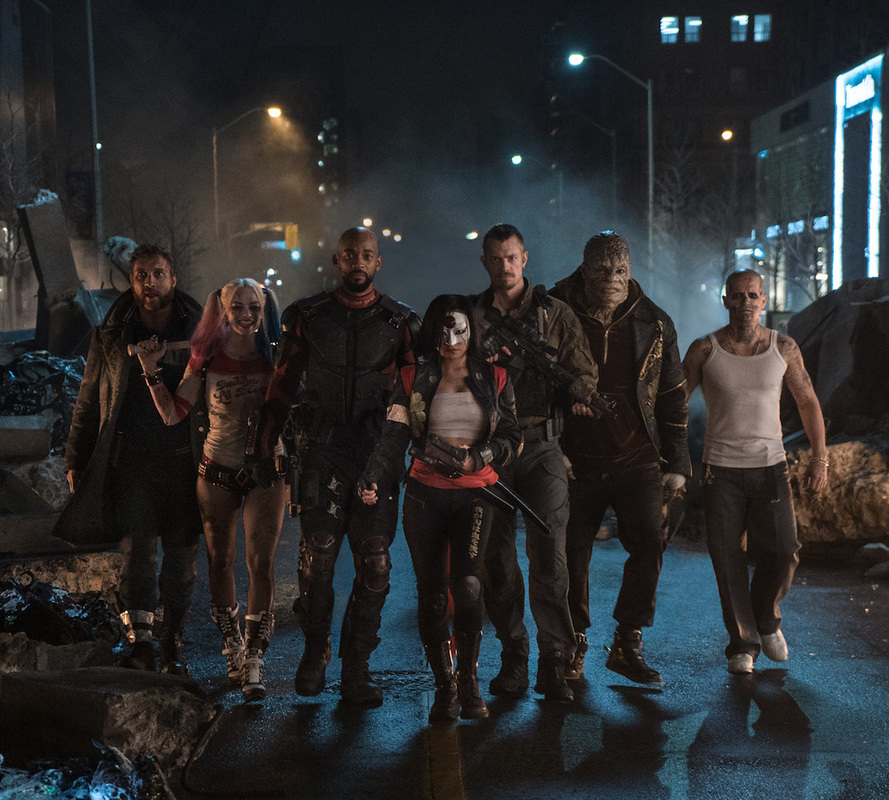Review:
"Suicide Squad"

Release Date: Aug. 5, 2016
Rating: PG-13 Running Time: 130 minutes Don’t send a superhero to do a villain’s job. That’s the takeaway from Suicide Squad, DC’s Dirty Dozen–like spin on such superhero team-ups as its forthcoming Justice League and Marvel’s The Avengers and Guardians of the Galaxy. On paper, the idea is sound. Assemble a bunch of bad guys and girls—led by Will Smith’s Deadshot and Margot Robbie’s Harley Quinn—and send them on a suicide mission to stop a witch from destroying the world. Throw Jared Leto’s the Joker into the mix and let chaos reign, right? Wrong. It’s not that the third entry in the DC Extended Universe is terrible. It’s an improvement over Batman v Superman: Dawn of Justice, which seems like faint praise. It’s just a wasted opportunity for DC and writer/director David Ayer. Ayer is perfect for Suicide Squad. The director of End of Watch and Harsh Times is a street-level filmmaker with a gritty visual style that complements the violent, uncompromising stories he tells about the male psyche under extreme pressure. He’s spent most of his career getting inside the heads of the psychologically tormented police officers who vow to protect and to serve but cross the Thin Blue Line for all the wrong reasons. Fury and Sabotage proved he can get the most out of an ensemble cast. With DC’s rogues’ gallery at his disposal, Ayer is given everything he needs to deconstruct the superhero mythos in edgy, whip-smart fashion. Instead, he ignores his instincts and suppresses his ambitions to deliver a dumbed-down generic tale of anti-heroism that lacks the sharp wit, anti-establishmentarian attitude and reckless abandon as Deadpool. Ayer never allows Suicide Squad to get as badass as the villains recruited to save the day. Which is surprising because Suicide Squad is so beholden to its criminals, assassins and metahumans that Ayer doesn’t feel the need to build a compelling story around them. We’re showing up to see Harley Quinn go loony tunes—so why should Ayer bother expending any energy on a coherent, well-structured plot that warrants the existence of this team of sociopaths and psychopaths? Like Batman v Superman: Dawn of Justice, Suicide Squad is a direct response to the death and destruction that occurred at the end of Man of Steel. With the formation of the Justice League still just Bruce Wayne’s pipe dream, Viola Davis’s high-ranking government official Amanda Waller comes up with the crazy idea of assembling the Suicide Squad to protect humanity from unknown evil forces. So she coerces the worst of the worst to join her cause. Ironically, it’s one Waller’s recruits, Enchantress (Cara Delevingne), who frees herself from her shackles to hold the world hostage with the help of her brother, the demonic Incubus (Alain Chanoine). Odd, but after spending two films carefully acclimating humanity to the existence of aliens, DC introduces metahumans and supernatural beings without blinking an eye. Talk about rushing into creating a mythology for your cinematic universe. So who are the Suicide Squad’s members? Let’s start with Deadshot, an assassin who never misses his target. Will Smith brings his trademark swagger to the role of the Suicide Squad’s moral center. But his constant bickering with the Suicide Squad’s field commander, Rick Flag (a miscast Joel Kinnaman), yields little drama. Margot Robbie’s as great as advertised as Harley Quinn. Robbie knows the Joker’s main squeeze is as psychotic as her lover, and she embraces Harley Quinn’s erratic behavior and violent impulses with unparalleled enthusiasm. But Robbie also finds the humanity within Harley Quinn to ensure she’s more than cartoon crazy with a disarming smile. Jay Hernandez offers a moving study in remorse as the flame-throwing El Diablo, who is haunted by the terrible deeds he has committed. Ayer, though, has trouble integrating comic relief Jai Courtney’s Captain Boomerang and Adewale Akinnuoye-Agbaje’s Killer Croc into this motley crew. (The same applies to Karen Fukuhara as Katana, a swordswoman who is tasked with protecting Flag.) Courtney and Akinnuoye-Agbaje are given next to nothing to do, and Ayer and Suicide Squad would have been better served had he dropped one of them and devoted more time to a core four villains. Adam Beach also makes a brief appearance as Slipknot, but he’s there just to show that Amanda Waller is not someone to mess with. It could be argued that Waller is the true antagonist of Suicide Squad because she has no qualms about breaking the law to uphold the law. This makes her very much of the corrupt world Ayer likes to explore, and it’s evident that Ayer finds her as complex and captivating as Harley Quinn. The take-no-prisoners Davis rules Suicide Squad with an iron fist, and thanks to the film’s mid-credits sequence, she establishes Waller as a force to be reckoned with in future DC Extended Universe installments. Those who complain that Marvel often has poorly defined villains may want to reconsider their position after Suicide Squad. The Enchantress’ agenda is unclear beyond her desire to retrieve her heart from Waller while Delevingne is about as menacing as a model having a meltdown. That brings us to the Joker. He’s not part of the Suicide Squad. But Leto appears throughout Suicide Squad in a subplot that’s awkwardly shoehorned into the film. The Joker has zero impact on Suicide Squad’s main narrative, and Ayer could have established the weird romance between Harley Quinn and the Joker had he limited the latter’s presence to flashbacks and the closing scene. Suicide Squad doesn’t need the Joker as much as it thinks it does. Besides, Leto’s garish interpretation of the Joker leaves little to be desired. Leto adopts the bluster and rat-a-tat cadence of a 1930s gangster while dressed up like a tatted-up Scarface. Heck, he even gets to fire a machine gun. But he’s all style and no substance. His is not a sharp or devious criminal mastermind/madman—just one who is too much in your face and quick to tell a joke even a preteen would groan at. He also doesn’t possess the seductive power that he needs to make Harley Quinn fall for him. Leto doesn’t make us forget Heath Ledger or Jack Nicholson. Whether Leto can go head-to-head with Ben Affleck’s Batman remains to be seen. Based solely on Suicide Squad, Deadshot would make a better adversary for Batman. Yes, Batman casts a long shadow in Suicide Squad, but Ayer botches his fleeting appearances. Ayer seems so preoccupied with trying to make Suicide Squad an ensemble effort, which proves to be an impossible task given the number of essential and superfluous characters he must contend with, that he fails to inject the action with any panche or intensity. For those worried that Ayer holds back on the violence to obtain a PG-13 rating, don’t be. Suicide Squad is as ferocious as any of Ayer’s R-rated thrillers but the blood and gore are absence (they could be added digitally if DC wanted to release an unrated version on Blu-Ray). Also, the pacing is too clunky for a film that is mostly confined to several buildings in the fictional Midway City. Ayer doesn’t give Suicide Squad a distinctive personality, and while he takes things a tad too serious, at least he steers clear of making it insufferably grandiose as Batman v Superman: Dawn of Justice. Suicide Squad underwent reshoots reportedly to lightened its tone in the wake of the criticism leveled at Batman v Superman: Dawn of Justice and the success of Deadpool. Even so, Suicide Squad doesn’t restore much faith in DC’s ability to steer its Extended Universe in the right direction to compete with Marvel. By being so impatient and reactive, DC continues to everything wrong that Marvel does right. But DC may have found in a savior in Margot Robbie’s Harley Quinn. If only she could dump the loser boyfriend who may prove to be the DC Extended Universe’s biggest liabilities. Robert Sims Aired: Aug. 4, 2016 Web site: http://www.suicidesquad.com |
|
